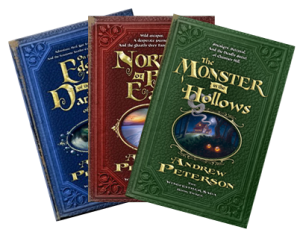The Christian Writer and Fiction
 I want to thank RLM for inviting me to guest post for Speculative Faith. As this is my first (and hopefully, not last) post, I want to lay out my philosophy of Christian writing. Then I want to give a perspective on why I think speculative fiction is a very suitable vehicle for theology, contra Mike Duran [one of Spec Faith’s previous guest bloggers].
I want to thank RLM for inviting me to guest post for Speculative Faith. As this is my first (and hopefully, not last) post, I want to lay out my philosophy of Christian writing. Then I want to give a perspective on why I think speculative fiction is a very suitable vehicle for theology, contra Mike Duran [one of Spec Faith’s previous guest bloggers].
The writing of fiction is a noble calling. As men and women made in the image of God and having the responsibility to fulfill the cultural mandate (Gen 1:28) to develop the potential of this world (which presumably includes story-telling as much as it does flute-playing, Gen 4:21), a writer of fiction can imitate God the Creator through the creation of a fictional world filled with characters, activity, conflict, history, plot, suspense, climax, and denouement. I discuss this on my own site in the article, “Reflecting God’s Creation Work in Our Writing.”
There is an intrinsic splendor to the written word akin to that beauty that cannot be separated from any work of fine art. It requires natural talent that is improved upon. For Christian writers who are serious about writing, it behooves them, as an honor to God who has given the talent to write, to devote the time and effort necessary to produce the best possible fiction they are capable of and not to shy away from an effort to rival the more popular and celebrated non-Christian works.
If one claims to write Christian fiction, then it ought to be precisely that, Christian. To be Christian it must contain that which is at the heart of Christianity, and that is the person and work of Christ, or more succinctly stated, it must contain the gospel. This does not mean that everything about the gospel must be in a novel to qualify it as Christian. But it must have something about it and not in a cloudy way. It should be clear and obvious.
 I am a Calvinist and hold fiercely to the five points of Calvinism (Total Depravity, Unconditional Election, Limited Atonement, Irresistible Grace, Perseverance of the Saints). So, when I assess whether or not a novel is Christian, I assess if the gospel is there, and if it is, how closely it lines up with a Calvinistic understanding. If it holds closely, it is robustly Christian. The further it strays from Calvinism, the more anemic it becomes. I admit that for most, this is far too narrow. But that is my thinking. It is the only thing that makes sense for me.
I am a Calvinist and hold fiercely to the five points of Calvinism (Total Depravity, Unconditional Election, Limited Atonement, Irresistible Grace, Perseverance of the Saints). So, when I assess whether or not a novel is Christian, I assess if the gospel is there, and if it is, how closely it lines up with a Calvinistic understanding. If it holds closely, it is robustly Christian. The further it strays from Calvinism, the more anemic it becomes. I admit that for most, this is far too narrow. But that is my thinking. It is the only thing that makes sense for me.
It is unfortunate that too much of what is touted today as Christian has very little to do with the gospel. It may assume a Christian metaphysic and refer to a Supreme Being that vaguely resembles the God of the Bible. It may incorporate a system of morals that are a fine reflection of biblical morals. But without the gospel, they are at bottom without meaning or rationale. Such a story is not a Christian story because it is too vague – there is no gospel that one can put his finger on. Even if the protagonist behaves in an exemplary way, there is no gospel behind it to explain how that is possible. It does not differentiate itself from the best that a non-Christian can produce.
Yet, there is nothing wrong for a Christian to write purely for entertainment, whether or not there is any allusion to a Supreme Being or a Christian metaphysic. Only, do not call it Christian fiction. Through such fiction, the Christian writer reflects God’s creative work by analogously creating a world which the reader observes and participates in through his imagination. Because of God’s common grace, Christian and non-Christian alike can read the Christian author’s ‘non-Christian’ novel, and enjoy it. We should be thankful for such Christian writing and for those who can write it well. Regrettably, as Mike Duran intimates, the Christian market may tend to overlook that point and not give these works a fair readership.
 One exception that I am aware of is Andrew Peterson (The Wingfeather Saga) who is doing very well in terms of Amazon ranking. And rightly so. It is a delightful tale that I recommend to all Christian parents who read to their children, or who have children who love to read. On the other hand, George Bryan Polivka (Blaggard’s Moon, The Trophy Chase Trilogy) has produced excellent fiction whose literary craftsmanship can go toe-to-toe with anything in the general market. Yet it has not been so well received. Perhaps pirate stories are not generally appealing. But every Christian who is a serious reader of fiction should have at least one of his novels on the shelf.
One exception that I am aware of is Andrew Peterson (The Wingfeather Saga) who is doing very well in terms of Amazon ranking. And rightly so. It is a delightful tale that I recommend to all Christian parents who read to their children, or who have children who love to read. On the other hand, George Bryan Polivka (Blaggard’s Moon, The Trophy Chase Trilogy) has produced excellent fiction whose literary craftsmanship can go toe-to-toe with anything in the general market. Yet it has not been so well received. Perhaps pirate stories are not generally appealing. But every Christian who is a serious reader of fiction should have at least one of his novels on the shelf.
Now to state the obvious. Writing is a craft that weaves words together according to rules of grammar and syntax to produce something that is meaningful. Through fiction, a story is told that has meaning. When read, it makes sense, and the reader can put the book down and reflect on what he has read because it said something that he understands. This is a self-evident truth, yet it has profound implications. It means that fiction is a suitable vehicle for conveying the teaching of the Bible. Christian doctrine – theology – is expressed in human language, and a work of fiction provides the means to do just that. The conveying of theological concepts is not restricted to such works as Louis Berkhof’s Systematic Theology. Indeed, if one requires a systematically thorough exposition of Christian theology, he may refer to such titles. But the expression of biblical doctrine is not limited to scholarly works. It can be developed in a Christian novel.
One may say that to do so, it would have to come through extended dialogue or sermonic monologue. Frankly, those are not bad ways of doing it, but they are not the only ways. Every element of good fiction writing has the potential to convey Christian truth. Old Testament narrative, though it is not fiction, uses the same grammar and syntax that fiction would use. That narrative is the story of creation, trickery and deceit, jealousy and hatred, the plagues of Egypt, the Passover, the Exodus, the tabernacle, the cultic ritual, the royal and prophetic personalities, all of which convey theological truth, even Christian truth albeit in the manner of shadow, as the New Testament letter to the Hebrews informs us (Heb. 8:5; Heb. 10:1).
Setting dialogue and sermon aside, Mike Duran points out that if Christian fiction is to convey theology, it “is pretty much consigned to showing doctrine through flawed characters and narrative, much like the Bible.” I wholeheartedly agree with that, and it is implicit in the OT narrative just alluded to. But we can go further. Fiction is not very good fiction, if fiction at all, without ‘flawed characters and narrative.’ As such, the gospel-story (narrative) is the story of sinful men and women (flawed characters) coming to repentance and faith in Christ, the Redeemer, whose sacrifice atones for their sins. The narrative does not stop at the point of conversion but continues with how such persons struggle with the remaining sin within them (flawed characters, again) and the sin in the world around them. How can that hamstring the creativity and talent of a good writer of fiction, as Mr. Duran contends? It is chock-full of possibilities and can be played out in a variety of plots and genres.
Another objection is the idea that “fiction explores issues or exposes things, but it doesn’t explain them.” The idea is that theology requires forthright explanation, and that is not what fiction does. If one thinks on that proposition, he sees that it is self-defeating. In the exploration of issues and the exposing of things, there comes understanding; understanding implies explanation, which is the by-product of exploring issues and exposing things. When writing for more than entertainment, explanation may not be an author’s foremost purpose, but it is unavoidable. Perhaps what Mr. Duran has in mind is that fiction is not the vehicle for systematic explanation, with which I agree. But to imply that fiction by nature is devoid of explanation is simply wrong.
 Fiction is such a versatile apparatus that one may successfully write with a deliberate intent to teach and clarify – to explain. The writer can still produce an excellent work that meets the qualifications of good writing and story-telling. Michael Crichton’s State Of Fear is a thriller dealing with the issue of global warming. In some ways, it serves as a primer on the subject. Granted, some contend that the novel’s heavy reliance on technical data, charts, graphs, etc. detract from the plot. Personally, I found those things very appropriate. The point is that it is a work of fiction. As fiction, it explored the issues surrounding global warming and sought to expose industry as a culprit of sorts. In the doing of that, Chrichton explains what the global warming debate is about. That Crichton’s was a deliberate effort to explain through fiction is obvious as he provides addenda in which he reveals his own conclusions on the issue and provides a bibliography of sources on which he bases those conclusions. What is important for my point is that the story itself relies heavily on research and presents it in a plot that is entertaining and educational. In its exploring and exposing, it explained.
Fiction is such a versatile apparatus that one may successfully write with a deliberate intent to teach and clarify – to explain. The writer can still produce an excellent work that meets the qualifications of good writing and story-telling. Michael Crichton’s State Of Fear is a thriller dealing with the issue of global warming. In some ways, it serves as a primer on the subject. Granted, some contend that the novel’s heavy reliance on technical data, charts, graphs, etc. detract from the plot. Personally, I found those things very appropriate. The point is that it is a work of fiction. As fiction, it explored the issues surrounding global warming and sought to expose industry as a culprit of sorts. In the doing of that, Chrichton explains what the global warming debate is about. That Crichton’s was a deliberate effort to explain through fiction is obvious as he provides addenda in which he reveals his own conclusions on the issue and provides a bibliography of sources on which he bases those conclusions. What is important for my point is that the story itself relies heavily on research and presents it in a plot that is entertaining and educational. In its exploring and exposing, it explained.
Speculative fiction, fantasy in particular, is especially suited to bring the reader face to face with biblical truth (See my article, “The Literary Genre of Fantasy and Its Use in Imparting Christian Truth).”
A Christian writer of fiction should strive to write fiction that rivals the work of our non-Christian peers. He should not shy away from writing purely for entertainment, but if he is of a mind to write Christian fiction, he should be careful to make it a story that is identifiably and pointedly Christian. He may write purely to entertain, or he may write to both entertain and teach, because fiction has all the necessary elements not only for amusement and pleasurable reading but also for explaining. As such, the Christian writer of fiction is engaged in a noble and valuable calling.
– – – – –
 Thomas Clayton Booher and his wife, Kaye, live in Sanford, NC. He is a graduate of Westminster Theological Seminary (1979, M.Div, ) and is a ruling elder at Countryside Presbyterian Church (PCA) in Cameron, NC. He served in the US Air Force (1972-1976) and the US Army (1983-1990). He taught at Sandhills Community College, Pinehurst, NC for nearly three years, and is currently a computer programmer. He is working on the rewrite of his Christian fantasy for young teens to adults, The Oerken Leaves, book one of the trilogy, The Whole Creation Groans. He guest posts in the Tulip Driven Life and you may follow his blog, Yellow House News.
Thomas Clayton Booher and his wife, Kaye, live in Sanford, NC. He is a graduate of Westminster Theological Seminary (1979, M.Div, ) and is a ruling elder at Countryside Presbyterian Church (PCA) in Cameron, NC. He served in the US Air Force (1972-1976) and the US Army (1983-1990). He taught at Sandhills Community College, Pinehurst, NC for nearly three years, and is currently a computer programmer. He is working on the rewrite of his Christian fantasy for young teens to adults, The Oerken Leaves, book one of the trilogy, The Whole Creation Groans. He guest posts in the Tulip Driven Life and you may follow his blog, Yellow House News.









































Aye, there’s the rub! So many authors have poor theology and inflict it on others (Ted Dekker has basically invented his own denomination). I think it’s the Christian’s responsibility to thrash out what they believe first, then put it in their book.
I was listening to Christian radio the other day, with its watered-down praise-and-worship sound, and it occurred to me that most music being produced these days is written by young people. Sometimes very young people. When you’re that young, you haven’t had time to see your faith at work in your life. I know I didn’t.
Also the big labels like everybody to sound the same. But that’s neither here nor there.
I think it’s the Christian’s responsibility to thrash out what they believe first, then put it in their book.
(the following is partly comedic sarcasm, in case there is any doubt).
Oh. Well, that’s discouraging. Writers have to have their theology all straight before they write.
I guess that’s another reason I don’t write fiction–or lasting non-fiction, for that matter. Blog posts, and what not, are about all I can manage.
It’s taken me 52 years to come to my current belief system–and I expect that process to continue until they pat me in the face with a shovel. So I guess I’d better not do any writing… ;p
hmmm, the quote thingy, didn’t work. Sorry about that. Hope it’s clear.
I mean the kind of theology like, “Gee, it’s hard to believe in someone you can’t see.” And nothing deeper beyond that. I can’t count the number of songs on the radio with variations on those words. It’s repeated over and over in Christian fiction, too. If you know what you believe, hey, write it.
Exactly, Kessie. Some Christian authors would give the impression they’re not entirely sure about the basics of the faith.
That goes beyond the glorification of “blind faith” and “voices from beyond” discussed in that other serial. some, for instance, have no clue how even to begin a rudimentary explanation for why a good and all-powerful God allows suffering. (It’s a tough issue, but we’re not entirely without reasons for why.)
It may be that authors know and are instead “pretending” not to know for the sake of their story — but that may actually be worse. It only leads to cliched plotlines and weakened characterizations, bored Christian readers, and scoffing secularoids.
Stephen,
That issue, “why a good and all-powerful God allows suffering,” is something that only the Christian fiction writer could handle adequately and correctly because he as a Christian, he knows the answer. That issue is so loaded with potentially good fiction and yet so profound that if done well, and with a proper biblical answer, it could rock the Christian literary world. It could rock the secular literary world. Think of it – Nazi death camps – tsunami, earthquake – brutality in war – brutality in family – the answer to Sophie’s Choice, etc. What an opportunity to bring glory to God in our Christian writing.
I’m going to disagree with you — we know the answer of the problem of pain to a point, but it’s something the Bible is actually sort of vague on — even Jesus declined to answer when the disciples brought the question to him.
I’ve heard a number of speakers try to answer the question (including N.D. Wilson — “Notes from the Tilt-A-Whirl”) and all the answers break down at some point. The thing is, God doesn’t really say. And I know Calvinists don’t like question marks — thus limited atonement and the rest (Sorry, I’ll try to stay off that topic) — but there are places where God doesn’t give answers. He just gives us a person. Jesus.
The best story that dealt with the problem of pain in a very real way, but in a light hearted way too, is GK Chesterton’s “The Man who was Thursday.” But again, it doesn’t really give an answer — it presents a person.
That is the beauty of fiction, is it deals in feelings and ideas that can’t be put into systematic theology — things that must be felt and experienced to be understood. And that’s why you can’t base your theology on fiction, and why you can’t make your fiction a work of theology. But the two should be working together — like fact and feeling, or spirit and truth.
Coming back to a “proper Biblical answer that would rock the world,” there isn’t one. There’s only a man who died on a cross and rose again. One who simply says “trust me.” And that, we can show in fiction.
I must respectfully disagree. I think the Bible does give us various clear reasons for the problem of pain. The *answer* to all pain is, of course, Jesus! 🙂 But I don’t think we are left in the dark about why pain occurs. I can think of many reasons God might allow a tragedy to occur, even a massive one:
– judgment on the ungodly
– chastisement for His child/children who is/are entrenched in sin, to work in their hearts
– the spreading of the gospel as people turn to God in the face of sorrow
– to give his child/children an opportunity to glorify Him in a time of trial
– to remind his people that this world is not our eternal home
– and many other more mysterious and more convoluted purposes for bringing people to Himself
…all of which bring Him glory and us good in the end.
As a Calvinist who doesn’t like question marks, I felt the need to speak up. 😉 I don’t believe God leaves us confused and in the dark about many things. There may not be *A* Biblical answer which will “rock the world”, but there ARE Biblical answers, and the world needs to hear them and know about them.
Just my two cents!
In Christ,
Bethany J.
Just as a tiny example – the main characters in my novel have a family catchphrase, “God has better things.” When disappointment or tragedy strikes, that is their way of reminding themselves that God is both completely in control, and completely good, and He allowed the trial to happen because He has better things in mind for them than a good situation at that time. Sometimes this just means that He is drawing them closer to Himself, which is the greatest and most wonderful gift of all!
In my humble opinion, that is a very succinct and effective answer to at least one kind of pain – the suffering of the godly. My characters, then, don’t merely think to themselves, “I don’t know why this happened, but at least I have Jesus” – but rather, “I don’t know why exactly this happened, but I can trust that because I am a follower of Jesus God WILL use this situation to bring about good things.”
On the suffering issue: I agree with much of all the responses so far in that sub-thread. Yes, Scripture says more about why God allows suffering, more than we (and some Christian novels) would like to admit. And yes, it is still difficult to deal with suffering personally. For example, quoting Romans 8:28 to someone suffering may be true, but I doubt Christ Himself — or Paul, writing that text — would have said it directly to people who were in the middle of suffering. Rather, it’s an excellent “preparation for suffering” verse. (Which is exactly how the apostle Paul used it.)
More Christian novels should deal honestly with suffering, rather than avoiding it, or worse, acting as if they’re the first to address the issue — without the benefit of Biblical wisdom and hundreds of years of church history spent discussing the problem.
The best novel I recently read that deal with the problem, overtly and yet with storytelling skill, was Konig’s Fire by Marc Schooley. It goes straight to the first item on your suggestions list: Nazi death camps. Read it.
Stephen,
Very nice observation about the use of Romans 8:28. Someone who is grieving may need simply to grieve. No amount of commiseration on our part, regardless of how sincere and understanding, will ease the grief. After grieving a while, I think one comes to a place where, to some extent, he is able to step out of the emotional press and look at things a little more objectively. Romans 8:28 can be very helpful then, too.
“More Christian novels should deal honestly with suffering, rather than avoiding it, or worse, acting as if they’re the first to address the issue — without the benefit of Biblical wisdom and hundreds of years of church history spent discussing the problem.”
That’s hitting the nail on the head! I think I’ll put that on my facebook status, giving you the credit of course.
I’ll try and get my hands on Konig’s Fire. I would hope to learn a lot on writing about suffering.
Good points. Then there is the theology issue. Everyone likes to think their take is THE take on it, and if someone else doesn’t line up with it, they aren’t Christian. Sometimes we end up shooting each other down in Christian circles because so-and-so shows a different theology we don’t agree with, but then we have no qualms watching Star Trek that presents a very secular view of the world. That brings one to the question, how much leeway do we give an author, both in their characters, and in the overall meaning of the fiction?
I’m also interested in your further breakdown/clarification on two issues you raised. One, for a story to have the gospel in it, from your pov, how overt does it need to be? Does someone need to get saved? Does it require somewhere in it a presentation along the lines of the Roman Road to Salvation or its equivalent? Or does that include maybe some more overt allegory, or showing someone coming to Christ, however that might happen, or….what? And where does a story that maybe shows a Christian learning a deeper walk with God? Is that not Christian because there isn’t a gospel message in it? Or is your meaning broad enough to include that? Trying to get a clearer picture what you are meaning here.
Two, by “explain” things, are you referring to a part of the story that goes along the lines of the cliched, “…and the moral of this story is…”? Or more overt showing? Or an appendix explaining the moral? Etc.?
I know for myself, such author injections, if it is not natural to the story, tend to break me out of the story. But it also may depend on the pov of the story. An omni pov would be easier to get away with it than with a first person, for instance, and sound natural.
I know in my own Reality Series, which I would label Christian (may not qualify under your guidelines) there is an element of conveying a Christian teaching through showing, primarily, though there are, here and there, some “explaining’ done. But it has been interesting to see what others have picked up from the stories, often not the point I had in mind at all, though still valid Christian teachings. Do we limit God’s use of our stories by explaining too heavily, so that it precludes God using it to teach other things to someone who needs it?
Rick, I think the examples Tom gives–the Wingfeather Saga and George Bryan Polivka’s books (I think he mentioned Blaggard’s Moon)–would suggest he doesn’t think the gospel needs to be trotted out like a sermon. Not even close.
While I think fantasy can be the kind of story Tom is talking about better than perhaps any other genre, I couldn’t help but think, as I read this post, that the Bible used people as types of Christ without stopping to tell us that’s what they were. In the same way, I think we as authors can do the same with our characters. Did Tolkien need to stop and tell us Aragon, the returning king, was a Christ figure? No not really. Why couldn’t a contemporary writer do the same sort of thing–perhaps, a husband buying back his wife from prostitution (or has that one already been used? 😉 )
State of Fear was horrible though. I wouldn’t use it as any model of how to integrate theology and fiction. Crichton broke up the pace of a fictional work by not only including anti-global warming charts; he actually footnoted his fictional characters when they said something that needed the reference explained. This is in addition to the idea of trying to argue that global warming is bad on the one hand, and making the GW people use portable lightning bolts and octopus toxin to murder people in a bizarre James Bond-like conspiracy.
It may assume a Christian metaphysic and refer to a Supreme Being that vaguely resembles the God of the Bible. It may incorporate a system of morals that are a fine reflection of biblical morals. But without the gospel, they are at bottom without meaning or rationale. Such a story is not a Christian story because it is too vague – there is no gospel that one can put his finger on.
I’m curious. I get this point, but how then do you avoid all Christian fantasy from descending into allegory?
To R. L. Copple:
I appreciate the caution about shooting down the other Christian writer because he doesn’t line up with one’s own theological stance. Frankly, depending on how far out that other writer’s theology is, it may be asbsolutely necessary to shoot them down. But you are right, great care must be taken. All Christians who are truly Christian have a common core theology. Even at the core there is variance of understanding, and I appreciate that. Yet, if I think one’s theology is ‘anemic’ I will most likely point it out because the anemia can adversely affect the larger audience of the readers. I think of ‘The Shack’ as an obvious and extreme example. In my opinion, it’s not merely anemic, it is blasphemous, yet it has sold millions and has been regaled as having the potential to do for our generation what John Bunyan’s ‘Pilgrim Progress’ did for his. Granted, that book probably falls outside of the anemic to robust range (i.e., it’s not really Christian, it’s heretical), and so, it is probably unfair to use it as an example. But it drives home the point that bad theology in fiction can be highly dangerous.
You asked, “for a story to have the gospel in it, from your pov, how overt does it need to be? Does someone need to get saved? Does it require somewhere in it a presentation along the lines of the Roman Road to Salvation or its equivalent?”
Absolutely not! But what it must do as a minimum is focus on what the gospel remedies, and that is the matter of sin. Suppose you write a story along the lines of ‘Lost Horizon’, and your protagonist is a true Christian. What would he do in Shangri La? What would you as an author do? There is no need of the Cross if there is no sin, and Shangri La would be no different than any other human society on the planet. That would be a fascinating story, and it would be true to the gospel though it does not cover everything in the gospel. Additionally, as you intimate, the gospel is pertinent to every stage of one’s spiritual condition, whether it be the deadness of the unbeliever, or the progressive sanctification of the believer. Any story that handles those well with a correct theology is robustly Christian.
Regarding the question of explaining things, fiction can explain through dialogue, reference (a quote from a fictional or real source), illustrative incidents, character interaction, etc. Two children fighting over which one gets the bigger piece of candy illustrates the inherent selfishness (and therefore sinfulness) of the human at an early age. The father who points this out to his sons articulates the point. The son who later that night can’t sleep because he is stricken by guilt produces empathy with the reader. The other son’s guiltless, cavalier attitude deepens the sense of human sinfulness. All of these bring the reader face to face with the problem of sin. They help to explain the problem. Yet, as valuable as these tools of fiction are, the problem has to be crystallized, made blatantly obvious, by a direct connection to what the gospel says about it. Sleeplessness due to guilt can be explained away as a psychological hang up, but the Christian writer will ensure that his story reveals what guilt really is.